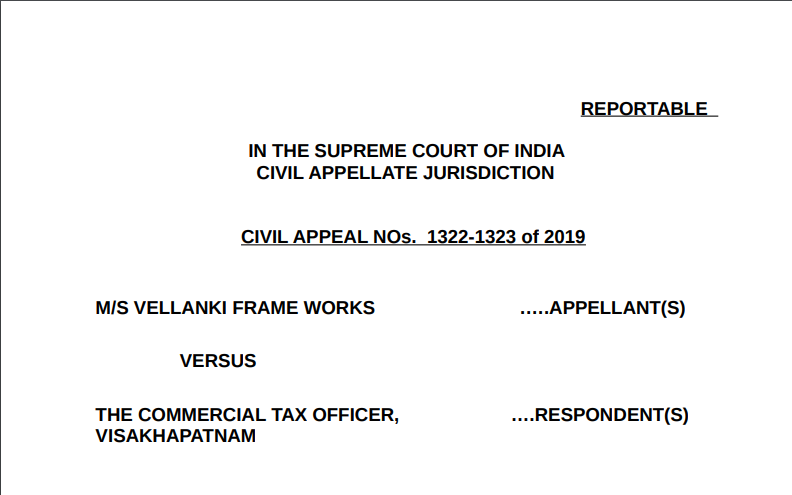Supreme Court in the case of M/s Vellanki Frame Works
Table of Contents
Case Covered:
M/s Vellanki Frame Works
Versus
The Commercial Tax Officer, Visakhapatnam
Facts of the Case:
These appeals by special leave are directed against the common judgment and order dated 18.12.2014 in Writ Petition Nos. 2552 of 2013 and 6258 of 2013 whereby, the High Court of Judicature at Hyderabad for the State of Telangana and the State of Andhra Pradesh upheld the assessment orders dated 20.01.2010 and 18.05.2010 passed by the Commercial Tax Officer, Chinawaltair Circle and held that the transactions in question were not the sales in the course of import but had been inter-State sales, liable to Central Sales Tax; and denied the exemption claimed under Section 5(2) of the Central Sales Tax Act, 1956 while granting time to the appellant to produce the prescribed C-Forms to the assessing authority for availing the benefit of concessional rate of tax.
We may usefully observe at the outset that, in all, seven transactions of similar nature form the subject matter of these appeals; one relating to the assessment for the year 2005-06 and others relating to the assessment for the year 2006-07. The common salient features of all these transactions had been that they were for the supply of timber from a foreign country and were allegedly executed in a similar fashion thus: The supplier (party number 1) sold the goods in question to the first buyer (party number 2) and delivered them at the port of shipment. Thereafter, while the goods were in transit on high seas, party number 2 transferred the goods to the appellant (who was invariably party number 3 in these transactions) by endorsing the bill of lading in favour of the appellant. Further to this and while the goods were on high seas, the appellant allegedly transferred them to the end-buyer (party number 4) by endorsing the bill of lading in favour of the end-buyer.
Observations:
The effect of raising of debit notes by the appellant on the end-buyers has its own bearing in the present case. The appellant had admittedly raised such debit notes on the end-buyers but only after having cleared the goods by filing the bill of entry for home consumption. Once the suggestion about the second high seas sales is not accepted and it is found that the appellant had been the importer of goods and had cleared them for home consumption, the natural consequence of raising such debit notes on the end-buyers situated in different States and movement of goods to such end-buyers would be to take these transactions in the category of inter-State sales in terms of Section 3(a) of the CST Act. The appellant was not entitled to the exemption of Section 5(2) of the CST Act and has rightly been held liable for tax over inter-State sales.
After the appellant got the goods released by filing a bill of entry for home consumption, indisputably, the goods were ultimately received by Radha at Lucknow in the State of Uttar Pradesh (and other end-buyers in different States) and the appellant raised debit notes from the State of Andhra Pradesh. These facts are sufficient to establish that the movement of goods inside the country from one State to another had been on account of the sale by the appellant to the end-buyers, and such sales took place only after the appellant obtained the goods from the bonded warehouse for home consumption.
The Decision of the Court:
For what has been discussed hereinabove, we are clearly of the view that the claimed exemption under Section 5(2) of the CST Act has rightly been denied to the appellant and the High Court has been justified in dismissing the writ petitions filed by the appellant. The High Court has yet been considerate and gave time to the appellant to submit C-Forms for availing the benefit of concessional rate of tax. No case for interference is made out.
Lastly, we may observe that in terms of the orders passed in these appeals, the appellant has deposited an amount of Rs. 7,07,325/- (rupees seven lakhs seven thousand three hundred and twenty-five) with the respondent. As these appeals are being dismissed, the respondent shall be entitled to adjust the same against the dues of the appellant.
As a result, these appeals fail and are dismissed with costs and with the observations foregoing.
Read & Download the full Decision in pdf:
 ConsultEase Administrator
ConsultEase Administrator
Consultant
Faridabad, India
As a Consultease Administrator, I'm responsible for the smooth administration of our portal. Reach out to me in case you need help.








